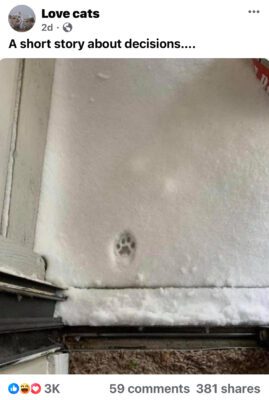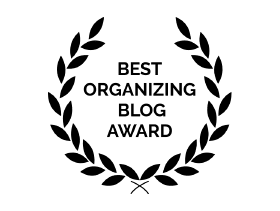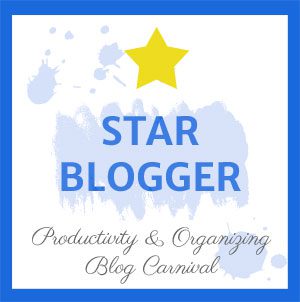Greetings, Fine Souls.
I’ve been pondering decisions in this New Year. Oh, wait…did you forget it’s still January? Because with the crummy weather and cabin fever all of your days have run together, and you’ve got serious, pandemic-era, time-means-nothing flashbacks?
Well no worries. You still have time to set some goals and think about what you want for your year (just as soon as the kids are out of your living rooms and refrigerators, and back in class).
Of course, setting goals or naming intentions (or however you’d like to frame it) means deciding what you’d like to pursue, focus on, or work towards. And there are so, so many choices. In his book Four Thousand Weeks, Time Management for Mortals, Oliver Burkeman writes:
“As I make hundreds of small choices throughout the day, I’m building a life—but at one and the same time, I’m closing off the possibility of countless others, forever.”
There’s the first hurdle – accepting you can’t do everything you’d like. Burkeman can be a bit of a buzz kill, but he’s not wrong.
And once you do choose, it’s just the beginning. How will you get started? How can you break the thing down into steps? What or who will make a difference in your success (assuming some degree of success is what you’re going for)? Should you go into it with easy expectations or shoot for the stars? No wonder the gym is empty by February 1.
When our friend Burkeman further states that “arguably time management is all there is,” following after, I’d say that arguably, decisions are the only way we move and breathe within time. They’re like the temporal Uber ride that gets us from one event or milestone to another.
Unless, of course, we don’t make them.*
I work with a fair number of folks who identify with the Enneagram Type 6 – The Loyalist. They have many beautiful qualities as do all the Types, but a fear of making major decisions is among their challenges. They are absolute geniuses at thinking things through, considering all the angles, and making the pros and cons lists. (Aside: some you may know pros and cons is a shortening of the Latin phrase, “pros et contra,” meaning “for and against.” It’s been in use since the 16th century, which tells you decision-making has been a thorn in the side of humanity, Type 6 or not, for quite a long time).
Thinking through all that stuff is laborious, and energy-sucking, and often leads to the Uber ride to nowhere – burning fuel and adding wear and tear on the engine with no final destination. This lack of conclusion is something we all experience from time to time. I’m kind of in it myself at the moment (it’s how I got here for a post – writing the stuff I need to read).
Here’s the thing I’ve been wondering about – are they really cons? If you set out all of your options and weigh them, the pros are usually reasonably evident. Otherwise, why even consider the decision in the first place? But I frequently observe that what we deem cons are based upon lots of assumptions – sometimes I call them “whatifisms.” Scenario:
If someone is considering whether to move forward with a job offer, the cons they list could include –
- I might not like it (what if the boss is a total narcissist?).
- They might not like me (what if I’m not as good at coding as I think I am?).
- My dog might develop separation anxiety (what if I don’t like working in their office?).
- Other people will be disappointed if I quit my current job (what if people get upset with me?)
And so on. None of these situations or their potential outcomes can be proven in the moment. They aren’t so much “againsts” as much as they are possibilities based on fears, and a concern of not being fundamentally ok with however the situation rolls.
(Ironically, we often make questionable decisions knowing objective “againsts” anyway – choosing to eat a particular food that we have a sensitivity to, or running that extra mile on a bum knee, for example. That’s probably another post.)
No joke, this came up in my feed while I was writing. Creepy ol’ Internet.
When you consider a decision in a decluttering process – say, whether to donate or sell an old chest of drawers that needs refinishing – you might go through a whole host of perplexing questions. What if I donate it and no one can do anything with it? What if I try to sell it and I have to deal with strangers? What if I can’t get the price I want? Does it matter if I make money off of it? What if it doesn’t find a good home (and hey – who decides what a “good home” is)? What if I get rid of it and then realize I still want it? What if someone who ends up with it doesn’t know how to refinish it?
More assumptions and fears, and lots of energy expended. You might ask, what’s objectively true here, right now?
- You don’t like, and no longer need, the chest of drawers.
- If the chest of drawers is out of the house, there will be more space.
- Keeping it means not having said space.
- Donating is the first thing you thought of, until you started asking all those damn questions.
Some research indicates that many decisions come from a gut-level understanding first, with objective data points coming in after to support that understanding (maybe because we can’t believe the decision could be so easy). I would call that understanding intuition, which is invaluable and underutilized.
I know – using your intuition is easier said than done. It’s worth practicing (and may be worth yet another post; such a big topic we’ve got going here).
You have no way to know all of the answers and possibilities for certain. And that’s ok. We don’t have a responsibility to control every outcome, and we very well may make a mistake. And that’s ok too. Most decisions are not matters of life or death; this is where trust comes in. Trust that we can handle what we consciously choose. Trust that even if we make a decision we later regret, at least we’ll further along on the ride than we were before. Trust that no one is perfect, we’re not perfect, and even when we carefully line up all the pros and fears, we might still choose something that turns out to be less than ideal.
Or…it might be amazing. Wouldn’t it be a shame to never find out?
“Mistakes are, after all, the foundations of truth, and if a person does not know what a thing is, it is at least an increase in knowledge if they know what it is not. ”
―C.G. Jung
*And here I resist the temptation to quote Barbara Hemphill’s “All clutter is the result of postponed decisions,” not because it’s not a wonderful and relevant quote, but because every organizer I know, and many of my clients, are already thinking it. I’m avoiding the phrase, “analysis paralysis” for the same reason. Just an aversion to organizing clichés, I guess.





I have found that as I get older, I tend to cut to the chase more quickly. I do go with the easiest solution to getting rid of clutter and then just move on.
Yes, I think wisdom grows and can make decisions much less fraught. I find it much easier with things, less so with the bigger life questions.
Making decisions can be tough. I like to ask my clients ‘what is the absolute worst thing that could happen…’ regarding whatever decision they are mulling over. If it is still preventing them from moving forward (because it is typically about an object or a piece of paper) I suggest they put it in a marinating box. Sometimes, I find, the best decision is to not make a decision. To let the ideas we’ve talked through percolate. We can move on to an easier task and return another time to the thing that is so difficult.
I like that strategy – I use the “worst thing that could happen” question sometimes, too. It’s related to a concept that psychotherapist Thom Rutledge calls “The ladder of fear.” Each time you uncover the “worst thing,” you go to the next worst thing, etc. Really helps to get to the bottom of the challenge. I like your marinating box idea too! As I mentioned in the post, it’s almost like I need to write a whole series on this issue. Thanks for commenting, Diane!
Great post, Sara! I know this is very common. However, I think it needs to be started again. If one doesn’t make a decision, that is, in fact, a decision. And that is OK. Sometimes, we don’t have the energy to decide or take the next step. Adding an appointment to a calendar to revisit the situation helps me.
Yes, that’s a good point, and I started to talk about energy and decision-making – but it was already a longer post than normal for me! Consciously choosing to postpone a decision with a plan to revisit can be a good strategy. I sometimes had clients label a box full of very sentimental items with a date, and then “Revisit on _________” with a date roughly 1-6 months in the future (depending upon whether it’s related to someone who passed, or something different). Heck, I even did that myself with a box of things that belonged to my dad after he died. Thanks for the reminder, Sabrina.
Great post, Sara! I often remind myself that I can only make a decision based on the information I have right now. When I get overwhelmed by the number of decisions I have to make, I take it as a sign that I need to simplify my life.
Oh that makes so much sense – decluttering the decisions in addition to making the decisions so you CAN declutter. Thanks for stopping by and the kind words, Karen!
I was working with a client today who was bemoaning having bought things that she didn’t end up using. While I acknowledge that situations like these can be a let down, I said what I always do, “No one makes perfect decisions.” That’s the starting place, not that all of us should always decide perfectly.
I love your discussion of how we tend to over-weight the fears and potential negative outcomes, rather than the known ones. I think this is one reason why decisions are so hard, because we are staring at some measure of unknown. Nevertheless, decisions must be made. If we can get comfortable with knowing we cannot control the outcome each and every time, and that we will make some winner decisions and some that maybe don’t work out so well, we can free ourselves to rally and make choices.
Great conversation!
Your client is lucky to have you there to reassure them, Seana. And yes- “staring at some measure of the unknown” – we don’t like that, do we, even as there’s absolutely no way to know much of anything beyond our present moment awareness. Thanks for your thoughts here, Seana!
Your post was exactly what I needed to read at this moment. Thank you, Sara.
I’m an excellent decision-maker and activator. I take time in deciding and use many methods for making my choices. Intuition is as integral to the process as cognitive processing. Some decisions are easier than others…the no-brainers, such as opportunities you lean into, even if you don’t know all the answers—or even small things like choosing what to eat when you go out to dinner.
But there are more challenging choices, too, like whether I should say “yes” to a volunteer opportunity that is more time-intensive than I have the time to give. That’s when those pros and cons get labored on longer.
Once I make a decision, I’m able to switch into the forward mode and activate.
However, there have been times when I made a choice (like recently) and fairly soon after thought I might have made a mistake. It’s where I am right now. So, for the moment, I’ve chosen to give ‘this thing’ one more shot, as in one more meeting. I will then stay in it or gracefully let it go.
I don’t like to reverse a decision or commitment once I’ve said “yes.” However, when circumstances are different than expectations, making a new choice is an option.
Thank you again for helping me to find more clarity around this one. You were immensely helpful.
You’re making me think about how much relief I feel (and I often see clients feel) once a decision IS made. There’s clarity, and the energy settles back down. I agree that we do sometimes have to backtrack – I think it’s ok, often necessary, and we have an opportunity to learn from the experience, right? I hope you are able to get more clarity around your choice, and I’m thrilled the post was helpful. As I wrote, it’s what I needed to read this week too!
I’m floored at the clarity with which you posit all of this. Focusing on the truths rather than the “what if” fears is a hard twist for someone who lives to avoid all risks (even the kinds that don’t really matter), but you’re absolutely right that the cons usually are potential, whereas the pros are actual. I need to remember that much more often!
I definitely struggle far more with forestalling opportunities than eliminating items. I’m fine with knowing, yeah, if I get rid of this thing, I may not have a perfect replacement in the wacky case of me wanting it again. But, as Burkeman notes, acknowledging that I’m cutting off the possibility by taking one tine in the fork of the road of life, knowing you can’t really double back? That definitely harder.
Of course, making decisions TO do something is much less stressful than making decisions NOT to do them (as long as there’s no financial weight to the decision — then, all bets are off)!
Hi Julie – I think it depends. Deciding TO do something can be difficult because we often don’t know how to think about the ramifications of the action. Like dropping a stone into a pond, what are all the ripple effects? If you never drop the stone, you don’t have to worry about any of that. Either way, I’m happy to read the conversation has you thinking through things. We can’t ever avoid all risks, can we?
Such an enjoyable read, Sara!
Are you familiar with SATISFICING? If not, it’s a gentle approach to decision-making that I’d love to share with you! Coined by the brilliant Herbert Simon, it’s pretty much about finding the sweet spot between “satisfy” and “suffice.”
Instead of getting bogged down in the pursuit of the absolute best option, focus on what’s good enough to meet the need.
Not appropriate in all situations (financial matters, medical advice, etc) but for a lot of decisions in life, it works beautifully.
Ooooh, Geralin – a new fun word! I like new words. I talk a lot about “good enough” with clients, but satisficing has a great ring to it. It sounds perfect for decisions like how to let go of something, or choosing where to start a project. Thank you for sharing it, and for commenting – it’s great to hear from you!
Thank you Sara, for sharing your wisdom around decision-making! I have struggled with decision-making throughout my life at times and have often complicated decisions by “what iffing” or researching endlessly, which ultimately postpones any true decision and the action that follows.
I have made much progress over the years by recognizing there are no perfect decisions. I am learning to trust my intuition and the universal creative spirit within and around me, to guide me to make the next right decision. Thank you for bringing such wisdom and hope to this topic! Peace, Bruce